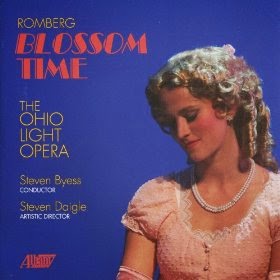The Ohio Light Opera is a cultural treasure. Based each summer at The College of Wooster, it’s one of only a few theater companies worldwide that present operettas in repertory with full orchestra. Gilbert and Sullivan were emphasized in the early years under founder James Stuart, but now the company has a long list of composers and works under its belt.
Among the most popular are titles by Sigmund Romberg who wrote Maytime (1917), The Student Prince (1924), and The New Moon (1928). Romberg, born in the Austro-Hungarian Empire in 1887 and educated in Vienna, came to the United States in 1909. He soon found his niche composing for the influential Shubert Brothers who produced Broadway musicals and revues.
The work reviewed here is Blossom Time, which Romberg created largely from direct quotes of melodies by early Romantic Viennese composer Franz Schubert. This pastiche includes music from Die Schöne Müllerin, Rosamunde, The Unfinished Symphony, and even, audaciously, Heidenrösslein and Die Forelle (“The Trout”). Romberg binds his work together with a recurring serenade he called “Song of Love”, taken from Schubert’s posthumous cycle Schwanengesang. As audiences recognized and loved the music, Blossom Time was very successful and had a long run after its premiere in fall of 1921. Notes accompanying the recording make clear that “Romberg recast the rhythms and meters of several songs to provide a more rollicking, waltz-filled operetta atmosphere.” His lyricist was former New York actor and director Dorothy Donnelly (1880-1928), who also collaborated on The Student Prince.
The story of Blossom Time is set in Vienna and centers on the frail genius Franz Schubert himself. It’s a frothy tale of love both young and old, a nobleman who passes off a Schubert tune as his own, a narrowly-avoided duel, and a bittersweet ending. Above all it is about beautiful music. The cast includes OLO veterans Ted Christopher as pompous Count Scharntoff and Boyd Mackus as Herr Kranz, father of the charming trio Mitzi, Fritzi, and Kitzi (what can I say, it’s operetta).
The work is uneven. The overture seems too long, the last act a bit stagnant, and the Schubert vs. Romberg styles clash at times. However there is pleasure in recognizing the recycled tunes, and (as it was the 1920s) an occasional touch of jazz creeps in, specifically the sextet at beginning of Act II. The singing is generally good. The final Act I duet between Schubert (Justin Berkowitz) and Mitzi (Amy Maples) is very pleasant to hear. Caroline Miller uses over-generous vibrato but perhaps intentionally as she portrays the larger-than-life opera singer La Bellabruna. This reviewer was sorry there was no aria for Mackus as Herr Kranz. His “Golden Days” sung by another Romberg character, Doctor Engel, lingers in the memory.
Performers: Justin Berkowitz, Amy Maples, Luke Bahr, Ted Christopher, Boyd Mackus, Caroline Miller, Steven Byess (conductor), Ohio Light Opera Orchestra.
Tina Spencer Dreisbach
Editor's Note: Tickets for the 2014 season are still available. Go to the OLO website for more information. Blossom Time was wonderful in performance!


No comments:
Post a Comment